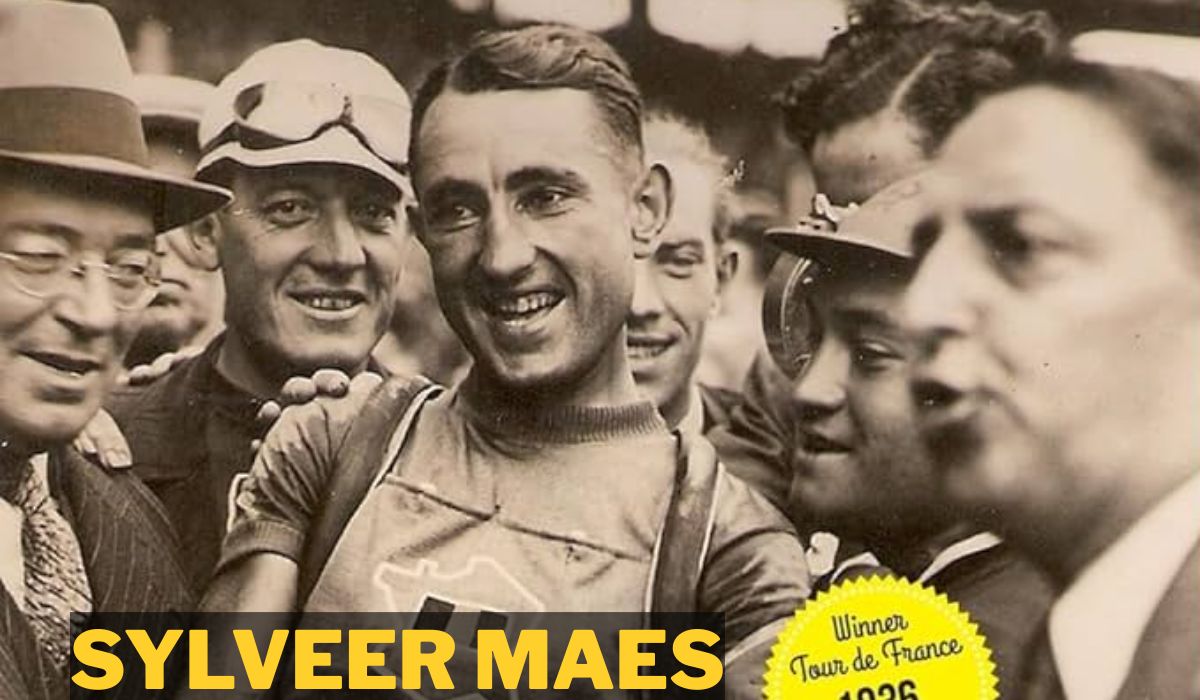
When people speak about cycling legends, names like Eddy Merckx or Fausto Coppi often dominate the conversation. But long before them, another Belgian rider had already carved his place in cycling’s golden era — Sylveer Maes.
A man of quiet strength, fierce discipline, and uncompromising values, Maes didn’t just race to win — he raced to represent the soul of a nation rebuilding itself between wars. His journey is one of determination, moral courage, and pure love for the sport.
The Humble Beginnings — Where It All Started
What inspired Sylveer Maes to become a cyclist?
Born in the small countryside of West Flanders, Belgium, Sylveer Maes grew up surrounded by fields, dirt paths, and the clatter of bicycles that carried workers to nearby towns.
In his youth, cycling wasn’t about fame — it was about freedom. A bicycle meant independence, escape, and opportunity. For Maes, pedaling those early country roads was less a hobby and more a calling.
He started racing in local village competitions, often with little more than determination and borrowed equipment. What he lacked in resources, he made up for with strategy and sheer willpower. People quickly noticed his calm yet calculated way of riding — never wasting energy, always observing, and striking at the right moment.
Rising Through the Ranks — From Local Races to Global Fame
How did Sylveer Maes make his breakthrough?
As he matured, Sylveer Maes began entering professional races that tested both physical endurance and tactical intelligence. Unlike riders who relied only on brute force, Maes studied his opponents.
He analyzed road gradients, wind direction, and even how competitors reacted under pressure. That attention to detail became his secret weapon.
When he entered Europe’s toughest cycling events, including the Tour de France, he wasn’t seen as a favorite. Yet, stage by stage, he climbed the ranks. What set him apart wasn’t just his legs — it was his mind. He could read the rhythm of a race like a musician reads sheet music.
Soon, his name was whispered among the peloton — not just as a strong Belgian rider, but as a potential champion who could challenge the French dominance of that era.
The Golden Years — How Sylveer Maes Conquered the Tour de France
What made his Tour de France victories historic?
Winning the Tour de France once is extraordinary. Winning it twice before the Second World War was nearly impossible. Sylveer Maes achieved this at a time when bicycles were heavier, roads rougher, and team support minimal. Riders had to fix their own bikes, endure brutal weather, and race over unpaved mountain passes.
In his first major victory, Maes displayed patience and power. He didn’t lead from the start — he waited for the mountains, where his endurance and mental control gave him an edge. As others faltered on the steep climbs, Maes found rhythm in hardship.
Every turn of his pedals was a testament to months of training, self-belief, and discipline.
His second Tour de France victory came after years of maturing into a complete rider. He was no longer just chasing the win — he was controlling the race. Rivals feared his quiet confidence. Spectators admired his humility. Belgium celebrated him as a national hero.
The Year of Controversy — Standing for Fairness
Why did Sylveer Maes withdraw from a major race?
In one unforgettable edition of the Tour, Maes led the overall standings and seemed destined for another victory. But controversy struck.
He felt race officials had made biased decisions that favored local riders. Instead of compromising his integrity, Maes did something unheard of — he withdrew from the race, even while wearing the leader’s jersey.
To most athletes, that would seem like career suicide. But to Maes, it was a statement of principle. He believed that victory meant nothing without fairness. His decision shocked the cycling world, yet it also earned him deep respect. Fans saw him not only as a champion but as a man of honor.
That moment became one of the defining acts of sportsmanship in cycling history. It showed that true greatness isn’t measured by trophies, but by character.
Racing Beyond the Mountains — The Mind of a Strategist
What made Sylveer Maes such a clever racer?
Sylveer Maes was known for his intelligence on the bike. In an era without modern radios, GPS, or nutrition science, he relied purely on instinct and experience. He knew when to attack, when to conserve energy, and when to let others exhaust themselves before making his move.
He often compared racing to a game of chess — each pedal stroke was a calculated move.
While others followed emotion, Maes followed reason.
He could remain calm even during chaotic conditions, saving energy for the decisive moments that defined races.
His tactical genius also made him a natural leader in team events. Younger Belgian cyclists often looked to him for guidance, and he quietly mentored many future champions who would carry forward his disciplined approach.
A Pause for War — And the Cost of Interrupted Dreams
When World War II erupted, professional cycling across Europe came to a halt. Like millions of others, Sylveer Maes’s career was suddenly frozen. He was at his peak, yet the global conflict meant no more Tours, no more racing crowds, and no finish lines to chase.
But Maes never truly stopped being a cyclist. Even in those dark years, he remained active in his community, helping others, maintaining his fitness, and waiting for the day cycling would return.
When peace finally came, he attempted a comeback — not for fame, but to prove that spirit and endurance don’t fade with time.
Though he never regained his pre-war dominance, his determination inspired post-war athletes. He showed that greatness isn’t only about results, but resilience.
Life After Racing — From Cyclist to Mentor
What did Sylveer Maes do after retiring?
After hanging up his racing shoes, Sylveer Maes transitioned naturally into leadership. He became a team director, guiding Belgian riders in international competitions. His experience, fairness, and understanding of cycling strategy made him one of the most respected directors of his generation.
Outside the competitive scene, he lived a modest life. He opened a small café in his hometown — a place filled with photos, jerseys, and memories. Locals often stopped by, not just to drink coffee, but to hear stories about the golden days of cycling.
Even decades later, visitors remembered his humble smile, his strong handshake, and his belief that “a true champion must ride with his head as much as with his legs.”
Why Sylveer Maes Still Matters Today
What can modern athletes learn from Sylveer Maes?
Sylveer Maes’s legacy extends far beyond the race tracks.
He represents values that modern sport often forgets — integrity, patience, and purpose.
Here are a few lessons his life still teaches today:
- Win with wisdom, not just power.
Maes showed that intelligence and timing often beat brute strength. - Stand for fairness, even when it costs you.
His refusal to accept injustice turned a moment of loss into a lasting symbol of sports ethics. - Success fades, character remains.
Medals can be forgotten, but moral courage never loses its shine. - Adapt through change.
From pre-war competition to post-war mentorship, Maes evolved with every challenge life threw at him. - Inspire quietly.
He wasn’t loud or flashy — yet his calm influence shaped generations.
Remembering the Legend — A Legacy Carved in Grit
Even though new names now dominate the cycling world, Sylveer Maes remains a cornerstone in Belgium’s sporting identity. His era may have passed, but his ideals — discipline, fairness, and resilience — are timeless.
Today, historians and cycling fans remember him not only for his Tour de France victories but for his human story. He was a farmer’s son who became a European champion; a competitor who became a moral compass; a cyclist who became a mentor.
The legacy of Sylveer Maes reminds us that sports are more than numbers — they’re narratives of courage that continue to inspire.
Conclusion
Sylveer Maes’s journey from rural Belgium to the peaks of the Pyrenees embodies the heart of cycling itself — a mix of endurance, intelligence, and integrity. He was not just a rider who won; he was a man who stood tall when fairness mattered most.
His story proves that heroes are not defined by how fast they pedal, but by how deeply they believe in what’s right.
As long as cycling continues to evolve, the quiet determination of Sylveer Maes will always ride alongside it — reminding future generations that greatness begins where ego ends.
Top 5 FAQs About Sylveer Maes
1. Who was Sylveer Maes?
Sylveer Maes was a Belgian professional cyclist who became one of the greatest riders of the 1930s. Known for his intelligence and integrity, he won the Tour de France twice and became a symbol of fairness in sport.
2. Why is Sylveer Maes considered a hero in Belgium?
He represented the spirit of hard work and honesty. Beyond his victories, his refusal to accept biased race rulings made him a national figure of moral strength.
3. What were Sylveer Maes’s biggest achievements?
His two Tour de France titles stand out, along with several classic race victories. But his true achievement was maintaining integrity in an era of intense rivalry.
4. What values did Sylveer Maes embody?
Discipline, intelligence, and fairness. He believed that real champions must ride with conscience — not just ambition.
5. How is Sylveer Maes remembered today?
He is celebrated as one of Belgium’s foundational cycling figures — a man who inspired future legends by proving that honor is as important as victory.




